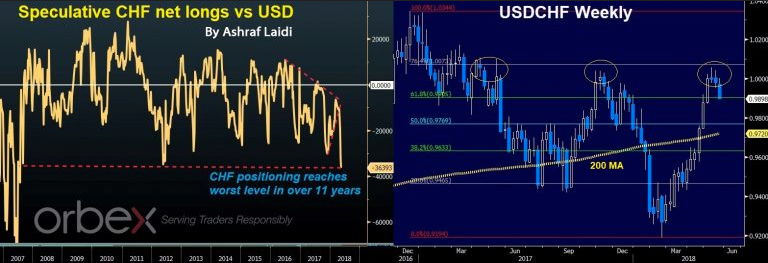3 Points On Swiss-Franc Strength
Ashraf Laidi | May 23, 2018 01:23PM ET
The recent strength in the Swiss franc has extended to the point of gaining versus all major currencies, including the US dollar over the past 2 weeks. Not coincidentally, the start of this period coincided with the breakout in the drama of Italian politics. But there are other factors enforcing franc strength. Will the currency require continuous fear in order to maintain its gains?
Black Smoke In Italy
Where do I start? Italy’s March elections ended in a deadlock between the anti-establishment 5-Star party (led by Luigi di Maio) and far-right League (led by Matteo Salvini). Since then, there have been prolonged disagreements over the choice of prime minister and formation of government.
The euro’s losses were deepened and Swiss franc gains amplified by proposals from both parties that threaten to widen the country’s budget deficit via a series of spending plans, a flat tax and the cancellation of pension reforms, which may cost over 100 billion euros. Italian bond yields soared to their highest level in nearly a year.
In Rome, doubts were cast over the suitability of Giuseppe Conte for the post of prime minister. A university professor who entered politics less than 3 months ago, Mr Conte is not only seen as a technocrat, but his centrist political leanings may cause even more political deadlock ahead. President Matarrella urged leaders to make a government or he would install a caretaker government ahead of new elections.
Ultimately, these political issues will be resolved. Italy has a long history of political drama, but muddling through and poor growth and debt dynamics have already been priced into the market. The risk of the new government announcing an exit from the euro or suggesting a referendum to do so remains negligible. This may mean a pause in the franc’s gains against the euro.
EM Selloff
Another driver of the recent bout of franc strength may last for longer. Several emerging-market currencies are cratering and that’s adding to the bid for safety. The chief culprits are the Argentine peso and Turkish lira, down 15% and 12% respectively since the start of the month, entering a state of crisis. That’s had knock-on effects to Latin American and eastern European currencies.
A positive near-term resolution here may not be so straight forward. Turkey has an election on June 24 and Argentina has turned to the IMF for help.
Overbought Vs. Oversold

From a currency sentiment perspective, futures markets are seeing the biggest amount of franc shorts against the US dollar in over 11 years. How can futures speculators continue to bet against the franc, while EUR/CHF is at 2-month highs? The answer lies within broader euro prospects and USD strength. Taking a step back, we note USD/CHF has failed to clear above the double-top resistance of 1.0050, a level that has held for twelve months and coincides with the 76% retracement of the decline from the late 2016 highs. The risk-reward return suggests there are more prospects for siding with the franc against the US dollar.

Trading in financial instruments and/or cryptocurrencies involves high risks including the risk of losing some, or all, of your investment amount, and may not be suitable for all investors. Prices of cryptocurrencies are extremely volatile and may be affected by external factors such as financial, regulatory or political events. Trading on margin increases the financial risks.
Before deciding to trade in financial instrument or cryptocurrencies you should be fully informed of the risks and costs associated with trading the financial markets, carefully consider your investment objectives, level of experience, and risk appetite, and seek professional advice where needed.
Fusion Media would like to remind you that the data contained in this website is not necessarily real-time nor accurate. The data and prices on the website are not necessarily provided by any market or exchange, but may be provided by market makers, and so prices may not be accurate and may differ from the actual price at any given market, meaning prices are indicative and not appropriate for trading purposes. Fusion Media and any provider of the data contained in this website will not accept liability for any loss or damage as a result of your trading, or your reliance on the information contained within this website.
It is prohibited to use, store, reproduce, display, modify, transmit or distribute the data contained in this website without the explicit prior written permission of Fusion Media and/or the data provider. All intellectual property rights are reserved by the providers and/or the exchange providing the data contained in this website.
Fusion Media may be compensated by the advertisers that appear on the website, based on your interaction with the advertisements or advertisers.